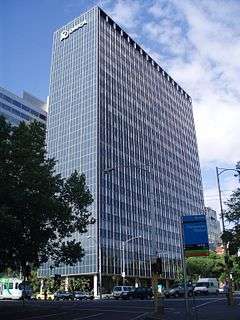ICI House
| ICI House | |
|---|---|
 ICI House | |
| General information | |
| Architectural style | International style |
| Town or city | Melbourne |
| Country | Australia |
| Coordinates | 37°48′32″S 144°58′24″E / 37.809°S 144.97344°ECoordinates: 37°48′32″S 144°58′24″E / 37.809°S 144.97344°E |
| Construction started | 1955 |
| Completed | 1958 |
| Client | Imperial Chemical Industries of Australia and New Zealand |
| Technical details | |
| Structural system | 81 meters, 20 floors |
| Design and construction | |
| Architect | Bates Smart McCutcheon |
ICI House (now Orica House) is a 19-storey office building in East Melbourne, Victoria, Australia. Begun in 1955, it was the tallest building in Australia upon completion in 1958, breaking Melbourne's long standing 132ft height limit, and was the first International Style skyscraper in the country.[1] It symbolised progress, modernity, efficiency and corporate power in postwar Melbourne, and heralded the construction of the high-rise office buildings, changing the shape of Australia's major urban centres forever.
The building's design, by Sir Osborn McCutcheon (of Bates Smart McCutcheon) was closely modeled on the best of corporate design being pioneered in the United States with all-glass high-rise such as the United Nations headquarters. Detail and documentation of the building's design was managed by Douglas Gardiner who was a partner of BSM.[2]
The building made headlines soon after construction as panes of the coloured glass shattered and fell to the street below due to impurities and the heat of Melbourne's summers.[3]
It is one of the few post-war office buildings to be found on the Victorian Heritage Register, and the first to be added.[4]
References
- ↑ Australian National Heritage listing for the ICI Building
- ↑ Architectural Heritage of the 20th century Retrieved 31 July 2013.
- ↑ When the price is too good article from The AGE
- ↑ "ICI House, Victorian Heritage Register (VHR) Number H786, Heritage Overlay HO165". Victorian Heritage Database. Heritage Victoria.